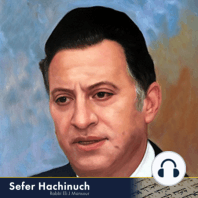20 min listen
Misva #286: Sacrificing Only Unblemished Animals
FromSefer Hachinuch
ratings:
Length:
20 minutes
Released:
Sep 22, 2022
Format:
Podcast episode
Description
The Torah commands in Parashat Emor (Vayikra 22:21), “Tamim Yiheyeh Le’rason” – that when one offers an animal sacrifice, it must be unblemished. Of course, it makes no difference whatsoever to G-d whether or not an animal sacrifice has a blemish. It goes without saying that He does not need our sacrifices, and so an unblemished animal does nothing for Him more than a blemished animal does. However, as the Sefer Ha’hinuch explains, the reason for this command is our perception, so that we will hold the service in the Bet Ha’mikdash in high esteem. People are very impressionable, and so if blemished animals were offered as sacrifices, they would belittle the service in the Bet Ha’mikdash. By requiring that all animals offered as sacrifices are unblemished, the Torah ensures that the people will feel respect and reverence for the service. The Sages listed 73 blemishes that disqualify an animal for use as a sacrifice. Of these, 50 have corresponding blemishes in human beings which disqualify a Kohen from serving in the Bet Ha’mikdash. The other 23 are unique to animals. There is a general rule that when it comes to bird sacrifices, blemishes do not disqualify a bird; a bird with a Mum (blemish) may be offered as a sacrifice. However, the Sefer Ha’hinuch notes that this rule applies only to minor blemishes. Major blemishes – such as a missing leg, or wings that have completely withered – indeed disqualify a bird for use as a sacrifice. Needless to say, this Misva applies only in the times of the Bet Ha’mikdash. A person who slaughtered as a sacrifice an animal with a disqualifying blemish, or who sprinkled its blood on the altar or offered its fats on the altar, has transgressed this affirmative command. He has also transgressed a separate Misvat Lo Ta’aseh (prohibition) forbidding offering a blemished animal as a sacrifice. The Rambam comments that it is possible for a person to be liable to four sets of Malkut on account of one blemished animal. The Torah forbids even consecrating a blemished animal, and thus one who consecrated such an animal, and then proceeded to slaughter it, sprinkle its blood, and offer its fats on the altar, is guilty of four violations and is liable to four sets of Malkut. In Hilchot Issureh Mizbe’ah (chapter 7), the Rambam writes that besides ensuring to offer specifically an unblemished animal as a sacrifice, one should try to offer the choicest, highest-quality animal. We show respect and love for Misvot by using only articles of the highest quality in observing them, and thus one who brings a sacrifice should choose the highest-quality animal. The Rambam notes that this was the mistake made by Kayin, whose offering was not accepted by G-d because he did not choose his highest-quality produce for his offering.
Released:
Sep 22, 2022
Format:
Podcast episode
Titles in the series (100)
Misva #8: Leaving Over Meat of the Korban Pesach: Daily Sefer Hachinuch - Brought to you by itorah.com by Sefer Hachinuch
